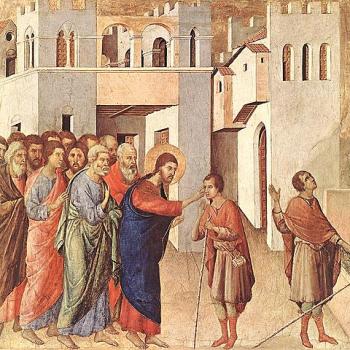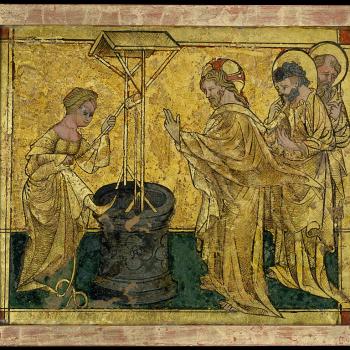
Paul warned us against acting religious, doing things merely to please people and the world around us, including and especially our fellow Christians, without first making sure our heart is in the right place. “If I speak in the tongues of men and of angels, but have not love, I am a noisy gong or a clanging cymbal. And if I have prophetic powers, and understand all mysteries and all knowledge, and if I have all faith, so as to remove mountains, but have not love, I am nothing. If I give away all I have, and if I deliver my body to be burned, but have not love, I gain nothing” (1 Cor. 13:1-3 RSV). We need to make sure we are transformed inside, in our heart, for that is required if we are to make sure what we do is not just done for show. Love, and love alone, will give us that transformation. Without love, our religious behavior, our good deeds in the world, can be easily perverted, because if they are not done out of and with love, we hold ourselves back from doing all that we can and should do. When we act without love, what we do comes out of some other calculation, usually one which seeks some private gain; we do it, therefore, filtered through our selfishness, corrupting what we do with our own self-interest. If we give money to the poor without such love, we do it for some personal gain, turning the poor into mere instruments of our will instead of subjects worthy of our love. We can fast, but if we do so without love, our fast easily becomes gluttonous, for we fast, not to detach ourselves from our undue attachments which distract us from love, but rather to find new means by which we can make ourselves greater, weightier in the vision of others.
Walter Hilton, understanding this, said that however difficult various feats are, none of them are as difficult as to the one feat which we need to do: to love everyone without reserve. In comparison to such love, acts extreme ascetic discipline are nothing:
There is no difficulty in waking and fasting until your head and body ache, or in going to Rome and Jerusalem on your bare feet, or in rushing about and preaching as if you wanted to convert everybody with your sermons. Neither is it hard to build churches or chapels or to feed poor men and make hospitals. But it is a very difficult thing for someone to love his fellow Christian in charity, and wisely to hate his sin while loving the man. For although it may be true that all the works I have mentioned are good in themselves, nevertheless they are common to good men and to bad, for everyone could do them if he wanted to and had the wherewithal. Therefore I regard it as no great feat to do what everyone can do; but to love one’s fellow Christian in charity and hate his sin can be done only by good men, who have it by the gift of God and not by their own labor, as St. Paul says: Cartias Dei diffusa est in cordibus vestris per Spiritum Sanctum qui datus est vobis. Love and charity is shed and diffused in your hearts by the Holy Spirit, who is given to you, and therefore it is the more precious, and the rarer to come by. [1]
It is love, loving one’s neighbor, which is most difficult, because our neighbor will have many aspects about them which we do not like, and they will get in the way of our love. Our neighbors will say and do things which make us angry (and often, rightfully so, if what they say or do is not good). Indeed, many of them do not desire or seek after what is good or just; they will not be concerned about the welfare of their neighbors, for they will only think about their own desires, propping themselves up so that they can satisfy their every wish, even if it comes at the expense of others. We are still to love them, even as Jesus loves us despite all we say and do. This does not mean we should affirm all that they do, rather, we must find that despite all they do, they still are a person made in the image and likeness of God, and so someone who should be loved. But, as Walter Hilton said, the hardest person to love is not just our neighbor, but rather, our Christian neighbor. We have greater expectations for them, and so we are that much more disappointed with them when they fail us than when our non-Christian neighbors act contrary to our expectations. Indeed, many of them use their faith, and the grace given to them, for evil, as we find them fighting against the common good. Even when they do this, we are still to love them. This does not mean we will leave their deeds unchallenged. We are to reject the evil which they do, especially if and when they do it in the name of Christ. Thus, to love someone does not mean we need to ignore the demands of justice. Rather, it means we will show everyone mercy, hoping that those who have done wrong can be restored to the justice which they lost due to their actions even as Jesus shows us mercy and gives us grace whenever we fail the dictates of love.
“Love bears all things, believes all things, hopes all things, endures all things” (1 Cor. 13:7 RSV). It is also never-ending (cf. 1 Cor. 13:8); just as good parents will love their children, no matter what they do (which is not to say they will not correct their children, when necessary), so we must love all, including, and especially our fellow Christians, no matter what they do. No matter how ashamed we are of what others say or do, we need to hold onto love, and with that love, seek to make things right. Loving someone doesn’t mean we let them do whatever they want without consequences, but it does mean, when we have to deal with what they have done, we do so with a justice that is combined with mercy, looking after their good even as we try to restore the common good. Nonetheless, as our love is meant for all, we should especially look for and promote those who are most abused, those who are in most need of our love and what we can offer them. We can and should love all, but we must also love and promote justice. Thus, loving our neighbor, loving those who are wicked, does not mean we ignore justice, but rather, love should be the basis we use to seek it out, and with it, the common good. What we do should always be done out of love. Even if love is the most natural of thing for us (as we are created in the image and likeness of God, in the image and likeness of love), thanks to sin, we find ourselves far from what we can and should be by nature, making it difficult for us to love as we should. We often find ourselves doing things which make us appear to be good, to be religious, but we do so, not because we have such love but rather, because we would like to mask the fact that we don’t yet have it. We must remember, various religious practices, while good, are goods meant to help us in attaining our natural foundation, that is, to help us so we can attain our natural ability to love and make sure all the things we do are then done out of such love. When we forget this, when we mask our failures by some external form of piety, we find they can prevent us from looking for and finding that love which we should have, making such actions truly worthless, as Paul understood.
[1] Walter Hilton, The Scale Of Perfection. Trans. Joseph P.H. Clark and Rosemary Dorward (New York: Paulist Press, 1991). 135-6.
Stay in touch! Like A Little Bit of Nothing on Facebook.
If you liked what you read, please consider sharing it with your friends and family!

















